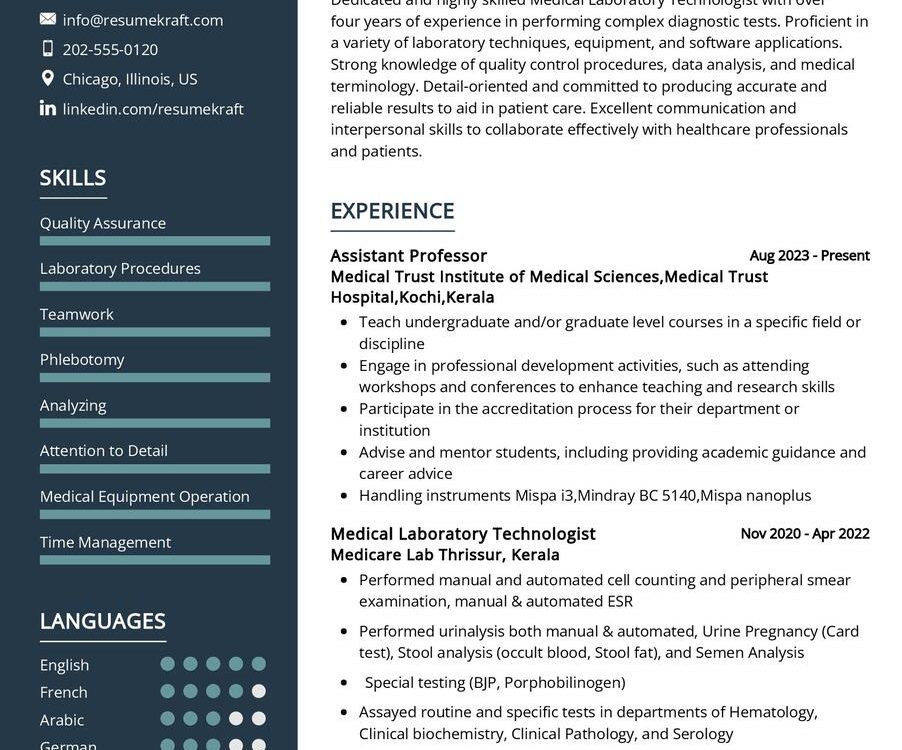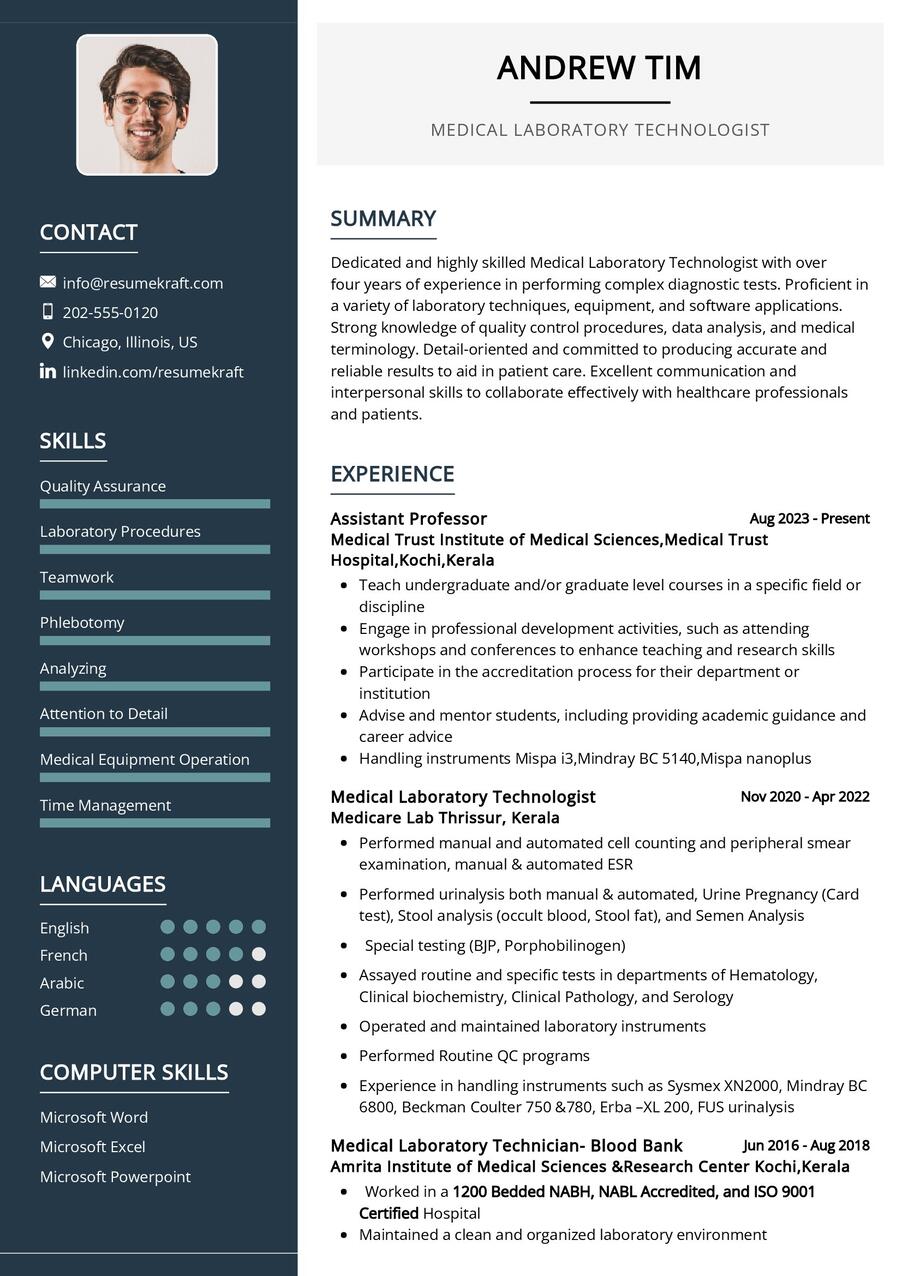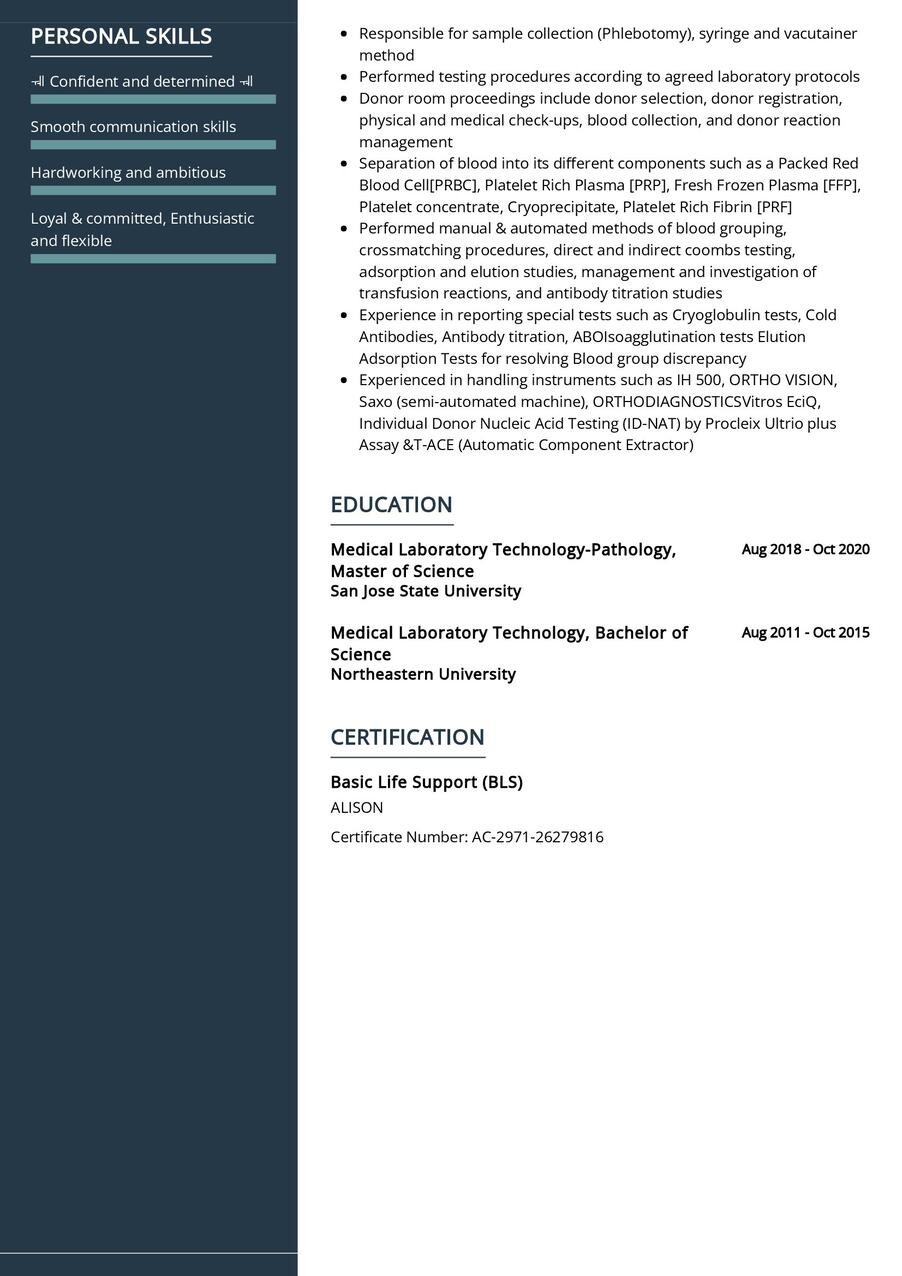Exploring the Role of a Medical Laboratory Technologist
In the ever-evolving landscape of healthcare, the role of a Medical Laboratory Technologist has become increasingly crucial. This position combines technical expertise with a commitment to accuracy, playing a vital role in diagnosing and treating various medical conditions. Let’s delve into the multifaceted responsibilities and requirements that define the role of a Medical Laboratory Technologist.
Understanding the Job Requirements for a Medical Laboratory Technologist
Becoming a proficient Medical Laboratory Technologist involves meeting specific educational and experiential criteria. Below are the key requirements for aspiring individuals in this field:
- A Bachelor’s degree in Medical Laboratory Science or a related field, providing a solid foundation in laboratory techniques and protocols.
- Comprehensive knowledge of various laboratory procedures, including but not limited to microbiology, hematology, and clinical chemistry.
- Hands-on experience in operating and maintaining laboratory equipment, ensuring accurate and reliable results.
- Strong attention to detail and analytical skills, essential for precise data collection and analysis.
- Excellent communication skills, as Medical Laboratory Technologists often collaborate with healthcare professionals to interpret and convey test results.
- Adherence to safety protocols and ethical standards, ensuring a secure and responsible laboratory environment.
- Certification from recognized accrediting bodies, such as the American Society for Clinical Pathology (ASCP) or equivalent, showcasing professional competence.
Additionally, continuous education and staying updated with advancements in laboratory technology are crucial for success in this dynamic field.
Responsibilities of a Medical Laboratory Technologist
The role of a Medical Laboratory Technologist is diverse, involving a range of responsibilities to support accurate medical diagnoses. Here are the key duties associated with this position:
- Performing various laboratory tests on patient samples, including blood, urine, and tissues, to aid in the diagnosis and treatment of medical conditions.
- Operating and maintaining laboratory equipment, ensuring accuracy and reliability in test results.
- Analyzing and documenting test results, maintaining detailed records for future reference and analysis.
- Collaborating with healthcare professionals, including doctors and nurses, to provide insights into test results and contribute to patient care decisions.
- Ensuring compliance with safety regulations and quality control standards to maintain a secure and efficient laboratory environment.
- Staying informed about advancements in laboratory technology and incorporating new techniques and methodologies into daily practices.
Each responsibility requires a blend of technical expertise, precision, and effective communication to contribute to the overall success of patient care.
Writing an Effective Medical Laboratory Technologist CV
Crafting a compelling CV is crucial for standing out in the competitive job market. Here are some tips to create an effective Medical Laboratory Technologist CV:
- Highlight your educational background, emphasizing relevant coursework and hands-on experience in laboratory settings.
- Detail your technical skills, specifying proficiency in laboratory equipment operation and various testing procedures.
- Showcase any certifications obtained from accredited organizations, underlining your commitment to professional development.
- Include specific examples of successful laboratory projects or challenges you’ve overcome, demonstrating your problem-solving abilities.
- Incorporate metrics where possible, quantifying your achievements and contributions to the accuracy and efficiency of laboratory processes.
Your CV is a reflection of your skills and experiences, providing potential employers with a comprehensive overview of your suitability for the role.
Medical Laboratory Technologist CV Summary Examples
Your CV summary is the first impression potential employers will have of your qualifications and expertise. Here are some examples to inspire you:
- “Dedicated Medical Laboratory Technologist with a Bachelor’s degree in Medical Laboratory Science and ASCP certification. Proven track record in performing accurate laboratory tests and collaborating with healthcare professionals to enhance patient care.”
- “Detail-oriented and certified Medical Laboratory Technologist with hands-on experience in microbiology and clinical chemistry. Adept at operating and maintaining laboratory equipment to ensure precise and reliable test results.”
- “Committed and highly skilled Medical Laboratory Technologist with a comprehensive understanding of hematology and strong analytical abilities. Recognized for consistently delivering accurate and timely test results.”
Your CV summary should succinctly capture your expertise, certifications, and commitment to excellence as a Medical Laboratory Technologist.
Building a Strong Experience Section for Your Medical Laboratory Technologist CV
Your experience section is the core of your CV, showcasing your practical contributions and achievements in previous roles. Here are some examples to guide you:
- “Conducted a wide range of laboratory tests, contributing to the accurate and timely diagnosis of medical conditions.”
- “Implemented and maintained quality control measures, resulting in a 15% increase in overall laboratory efficiency.”
- “Collaborated with a multidisciplinary healthcare team to provide valuable insights into patient care decisions.”
Each experience listed should highlight your impact, contributions, and ability to thrive in a dynamic laboratory environment.
Educational Background for Your Medical Laboratory Technologist CV
Your educational background is a cornerstone in establishing your qualifications. Here’s how you can present your academic achievements:
- Bachelor of Science in Medical Laboratory Science, XYZ University, a comprehensive program providing a solid foundation in laboratory techniques and protocols, 2018.
- Certification from the American Society for Clinical Pathology (ASCP), showcasing professional competence and commitment to high standards, 2019.
- Participation in continuous education courses and workshops to stay abreast of advancements in laboratory technology.
Your education section should emphasize your commitment to ongoing learning and staying current in the field of Medical Laboratory Science.
Key Skills for Your Medical Laboratory Technologist CV
Your skill set is a valuable asset, reflecting your proficiency in various aspects of medical laboratory work. Let’s outline the key skills for a Medical Laboratory Technologist CV:
Soft Skills:
- Attention to detail, ensuring precision in laboratory testing and analysis.
- Effective communication, facilitating collaboration with healthcare professionals and clear interpretation of test results.
- Problem-solving abilities, essential for addressing challenges in laboratory processes and procedures.
- Adaptability and flexibility, enabling you to thrive in a dynamic and fast-paced healthcare environment.
Hard Skills:
- Proficiency in operating laboratory equipment, showcasing your technical expertise.
- Comprehensive knowledge of laboratory procedures in areas such as microbiology, hematology, and clinical chemistry.
- Adherence to safety protocols and ethical standards, ensuring a secure and responsible laboratory environment.
Each skill is a valuable tool in your toolbox, contributing to your effectiveness as a Medical Laboratory Technologist.
Common Mistakes to Avoid in Your Medical Laboratory Technologist CV
While crafting your CV, be mindful of common pitfalls that can hinder your chances of securing the desired role. Here are some mistakes to avoid:
- Using a generic CV template, which may not effectively showcase your unique qualifications and experiences.
- Focusing solely on job duties without highlighting specific achievements and contributions in each role.
- Overlooking the importance of a well-crafted CV summary, as it serves as the first impression for potential employers.
- Neglecting to tailor your CV for each job application, missing the opportunity to align your qualifications with the specific requirements of the role.
- Skipping the proofreading process, as errors can diminish the professionalism of your CV.
Avoiding these mistakes will help ensure that your Medical Laboratory Technologist CV is compelling, authentic, and tailored to stand out in the competitive job market.
Key Takeaways for Your Medical Laboratory Technologist CV
As you conclude the crafting of your Medical Laboratory Technologist CV, keep these key points in mind:
- Highlight your educational background, technical skills, and relevant certifications to showcase your qualifications.
- Detail your practical experiences, emphasizing specific achievements and contributions in each role.
- Craft a compelling CV summary that succinctly captures your expertise and commitment to excellence.
- Avoid common CV writing mistakes, such as using generic templates and neglecting proofreading.
Your CV is more than a document; it is a narrative of your skills, experiences, and commitment to excellence as a Medical Laboratory Technologist. Best of luck!
Finally, feel free to utilize resources like AI CV Builder, CV Design, CV Samples, CV Examples, CV Skills, CV Help, CV Synonyms, and Job Responsibilities to create a standout application and prepare for the [Medical Laboratory Technologist] job interview.




 Special testing (BJP, Porphobilinogen)
Special testing (BJP, Porphobilinogen) Worked in a 1200 Bedded NABH, NABL Accredited, and ISO 9001 Certified Hospital
Worked in a 1200 Bedded NABH, NABL Accredited, and ISO 9001 Certified Hospital